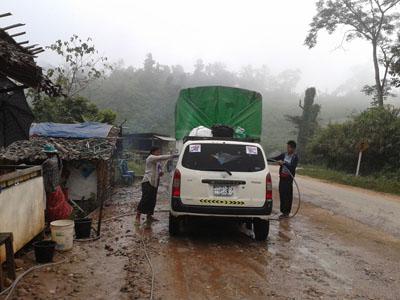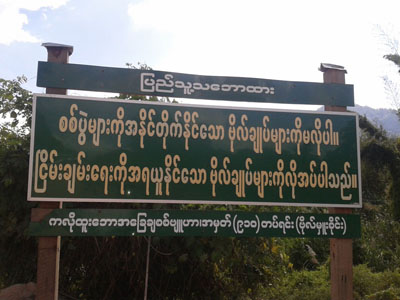SONE SEEN MYAING, Karen State — About a five-hour drive from Myawaddy through mountainous jungle, hundreds of people gathered this week at the headquarters of the Democratic Karen Benevolent Army (DKBA) to debate the future of the ethnic Karen people’s rebel armed forces.
Armed leaders, village elders, ethnic politicians and more than 200 civil society representatives came together in the remote town with one thing on the agenda: unity. The Karen Ethnic Armed Group Conference, hosted by the DKBA, was meant to last three days and focus on establishing a unified alliance of Karen armies called the Kawthoolei Armed Forces (KAF).
The DKBA is a breakaway faction of Karen State’s most dominant insurgent group, the Karen National Liberation Army (KNLA). The Karen are an ethnic minority with an estimated population of 7.5 million, most of them living in the land-locked southeastern state bordering Thailand.
The Karen have been at war with Burma’s central government for more than 60 years to achieve greater autonomy. Those decades have transformed the rebel movement; splinter groups, religious differences and leadership quarrels have left the Karen resistance still strong but fractured.
Earlier this month, leaders of three Karen armed groups announced a plan to fortify their resistance; the establishment of the KAF would unify Karen soldiers as allies against the Burma Army while retaining each group’s uniforms, insignia and command structures.
“Our Karen armed groups have scattered; we need to have one armed force in order to protect our people,” said DKBA Chief Gen. Saw LahPwe, addressing Wednesday’s crowd in his mother tongue, Sgaw Karen.
The initial proposal to establish the KAF came about after intermittent fighting broke out in three townships between Burmese troops and a number of smaller ethnic Karen forces, including the DKBA. Attacks against these groups, some feared, risked derailing the country’s fragile peace negotiations; many viewed the skirmishes as small parts of a more strategic offensive by the Burma Army.
Ethnic military leaders moved fast to find a remedy, and on Oct. 14, commanders of the state’s two biggest armed groups—the KNLA and the Karen National Defense Organization (KNDO), both armed units of the KNU—and two KNLA breakaways—the DKBA and the KNLA Peace Council—all endorsed the KAF. The KNU, however, quickly distanced itself from the plan, revealing a widening gap between the Karen leadership’s military and political aims.
The KNU has also struggled with internal disputes between pro- and anti-ceasefire elements, which ultimately led it to “temporarily suspend” participation in the country’s most powerful ethnic alliance, the United Nationalities Federal Council (UNFC), while maintaining its place in peace negotiations as a member of the Nationwide Ceasefire Coordination Team (NCCT).

The KNU’s apparent bend toward signing a ceasefire was perhaps underscored by the group’s Central Standing Committee meeting earlier this week, after which it announced that it would prolong UNFC suspension and postpone unification until the issue could be discussed at their next congress, two years from now.
“What will Karen people do about this in the meantime? Within two years, even the president will be replaced, the KNU will have a new chairperson,” said Saw Moe Shay, the deputy army in chief of the DKBA. His concerns were echoed by nearly all attendees of the Sone Seen Myaing summit when the KNLA’s 7th Brigade commander, Gen. Paw Doh, explained the KNU’s position on Wednesday.
“We will decide at the KNU congress,” Paw Doh announced to the crowd, who came to the meeting expressly to secure a plan for unity and equality among the Karen resistance’s disparate forces. “We understand that everyone here wants peace and unity. I will bring all decisions made here back [to the KNU], and we will discuss the reunion of the Kawthoolei armies.”
There was one set of voices in these discussions that seemed unanimous: civilians.

“If the Karen armed groups could form an allied force, I feel that we will have peace and there will be no more fighting,” said a 45-year-old Karen man who attended the meeting in traditional attire.
Eh Phaw Wah, a member of the Karen Youth Network, said that unity is something that all Karen people wanted, young and old. Disunity among Karen military and political leadership, she said, was a recurrent topic among the members of her organization, who overwhelmingly support a united Kawthoolei Armed Forces because they no longer feel protected.
“When I told our youth members that the Karen will form an allied armed group called Kawthoolei, they were very happy about it,” she said, emphasizing that she hoped to see it happen immediately because local people are still anxious and worried because of recent fighting. “They feel that this alliance will provide security.”

















